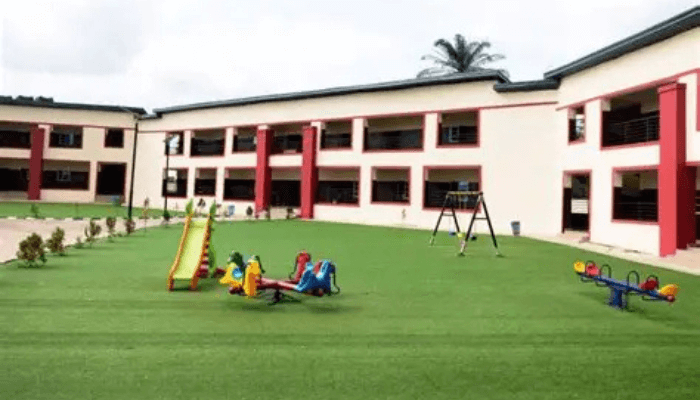Education in Enugu State is, apparently, undergoing a renaissance buoyed by the new Smart Green Schools initiative of the Peter Mbah administration, which is spread across both urban and rural communities.
This initiative is a revolution of sorts in the education sector of the state, transforming teaching and learning from a traditional to a more contemporary and technology-driven education system. This is not only visionary and transformative, but also indicative of the government's ability to think beyond today.
The initiative is based on the state's slogan – Tomorrow is here – which means, among other things, that the future of the state and its people is not far away, or that the various advances of the state government are a testament or the essence of things to be hoped for.
Also read: MBAH transforms education, starts transformation into smart green schools
Most appropriately, 'tomorrow is here' is not just a catchphrase, but a contract with the future; It is the recognition that the sovereignty of the state, Nigeria and indeed Africa will be determined by the strengths of young people – their ability to think critically, innovate and act with integrity.
On the strength of the above, this initiative reflects the future of both boys and girls in an increasingly digital world, where education is moving away from memorization. It comes with 'unintended consequences' that are adding more value and making the original intention more meaningful.
Although the implementation of this initiative has not been uniform, as urban areas are ahead of rural areas in terms of take-off time, its social and economic impact has neither been lost nor negated in both areas.
Building the infrastructure required for this initiative has turned many rural communities in the state into giant construction sites. Visiting some of these sites a few days ago was an exciting moment for this reporter.
It is really exciting how the construction of classroom blocks and diverse buildings is changing the rural landscape and creating employment for local people, who work as masons, carpenters, iron fitters and laborers at project sites, assisting skilled workers in mixing cement or carrying blocks.
Unlike urban areas, where some of these facilities have been provided and schools have started, buildings at the project sites visited, including Umuogbo, Umuida and Ikpamodo in Igbo Eze North Local Government Area of the state, are in various stages of completion.
At Umuogbo Ekposhi, where the school is located adjacent to the Model Comprehensive College, Ekposhi, one of the workers, apparently an engineer, told this reporter that the workers earn substantial income cumulatively, adding that the daily wage for workers ranges from N4,000 to N10,000, depending on the level or type of skill.
“All of us working here are happy with the government taking this initiative, not only because of our income, but also because of the hope and promise of a better tomorrow for our children. Again, buildings are changing this environment. By the time they are completed as per the specifications, this place will be a sight to behold,” said the worker, who did not give his name.
At the time of the visit, more than 15 construction workers were on the ground, and it was revealed that some of them were absent from work on that particular day for various reasons, including bereavement.
In Umuida, where the school is also located near the Community Secondary School, it was observed that many buildings were at roof level, which is different from the situation in Ikpamodho where most of the buildings were at lintel level.
ALSO READ: TVET: MBAH forges Enugu's prosperity through technical and vocational education
Both sites were filled with workers who worked enthusiastically, not only because of the income they earned, but also because of the possibilities and opportunities that such an initiative brings to a community and its people.
“Many of our people are going to work here as teachers; some will work as security personnel, cleaners, office assistants and even food vendors will be allowed to sell and earn money here,” said Ifeanyi Idoko, a retired school teacher, adding, “In fact, we can see tomorrow today.”
The ongoing construction and structures reflect the vision of the MBAH administration, which includes a move away from old school structures to world-class infrastructure and experiential learning. Each school building is designed as a complete ecosystem for learning, meaning that the child coming out of the school will be a 'whole human being'.
As an initiative, Smart Green Schools aims to revolutionize education by integrating sustainability, technology and innovation into modern learning environments. It focuses on creating eco-friendly, tech-enabled schools that foster creativity, digital literacy and environmental awareness among students.
Speaking at the launch of the smart schools, Governor Mbah said the initiative is very close to his heart. “This project is very close to my heart; it represents the most personal and transformative project of my leadership.
Schools are not just schools, but also my promise of a new society and my contract with the Enugu child. In that child, 'Tomorrow is Here' finds its true form,” he explained.
As per the definition of the words, 'smart' means integrating technology, critical thinking and problem-solving in every subject. Each has about 25 digitally connected modern classrooms, ICT centres, robotics and AI laboratories, e-libraries and spaces for experiential learning.
The schools are called 'green' because they have renewable energy sources and smart farms where children plant, grow and harvest crops, learning agriculture not as theory, but as practice.
The Governor sees the schools as a new era in the history of the state and the lives of the children of the state. This is their signature initiative, which involves shifting existing primary and junior secondary schools to smart green schools.
Also read: Mbah rushes to transform Enugu, revive moribund state-owned companies
In the opinion of the Governor, world-class infrastructure and experiential learning designed for smart schools is what is needed to equip Enugu children with the knowledge and skills to compete in the global economy. With this, the state is no longer waiting to be served, but is shaping the future on its own terms.
“Africa is the youngest continent in the world today. More than 60 percent of our people are under the age of 25. By 2050, our population will reach 2.5 billion, and one in every three young people on Earth will be African. This is a clear reminder that our future will be built by young hands.
It's not just a statistic; This is an order. This means that the fate of African countries depends on what we nurture in the hearts and minds of our children. If we raise them well and leave them opportunities, then when they inherit tomorrow, when they own it, they will shape it and protect it. If we fail them, no slogan will save us,” he said.











